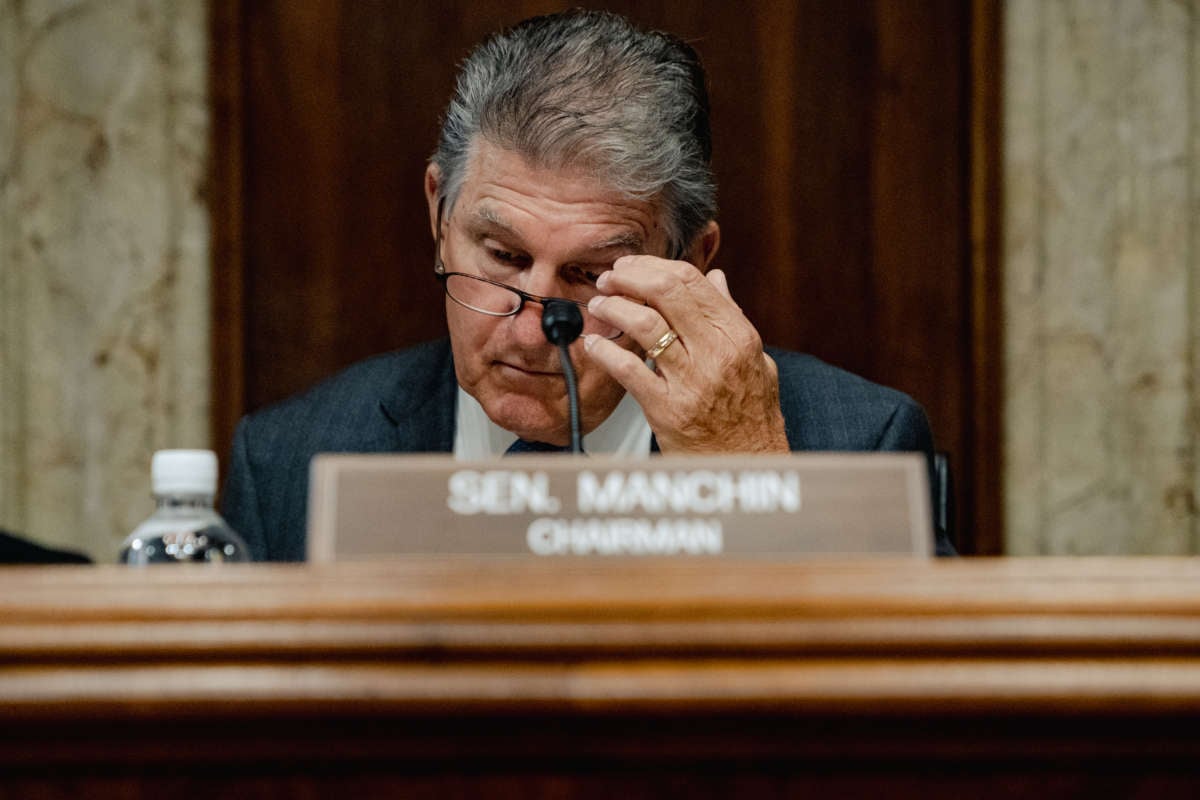Part of the Series
Covering Climate Now
Honest, paywall-free news is rare. Please support our boldly independent journalism with a donation of any size.
Frontline climate leaders just secured a huge win by stopping West Virginia Sen. Joe Manchin’s pipeline bill from weaseling into the Senate’s key funding bill. In the face of fierce opposition, conservative Democrat Manchin asked Sen. Chuck Schumer (D-New York) to remove this “permitting reform” bill from the continuing resolution just hours before they voted on its fate.
The importance of this national victory being accomplished by frontline organizers cannot be overstated. Frontline leaders joined forces together to lobby and call their representatives, tell their stories, and rally in Washington, D.C. and elsewhere, with the support of “Big Green” environmentalists. This was made possible by years of relationship building amongst frontline organizations and, notably, efforts to repair the relationships between grassroots organizations and Big Greens. On the latter, there is still a lot to be done, but this was a significant step where big organizations followed the lead of the grassroots and uplifted their voices, even after grassroots voices were left out of conversations about the Inflation Reduction Act that many of these Big Greens trumpeted as a win.
Manchin’s bill threatened to fast-track the pipeline I spent my days fighting to stop. Prior to my time fighting the Mountain Valley Pipeline (MVP), I was a national climate organizer with 350.org and before that I was a global climate advocate with the World Resources Institute. I have seen many wins and losses in the climate movement and this one strikes me as particularly special.
Before the news broke that Manchin had side-swept his side deal, I tried not to think about what would happen if this bill passed because it threatened to overturn the core objective of my work: stopping the Mountain Valley Pipeline. But late one night after a long day of work, I sat down in my living room and let myself consider what was at stake. From my perspective in the MVP fight, what came to mind was the near-decade fight to stop this pipeline from steamrolling through Appalachia. I saw the faces of all the people I fight alongside who have been in this from the start and who have dedicated their life to stopping this pipeline. These people have set aside their lives as outdoor adventurers, farmers and coffee baristas to prevent this pipeline from destroying what they love most: their people and mountains. At that moment, the audacity of Sen. Joe Manchin to sacrifice his own constituents to fast-track an unnecessary pipeline during a climate crisis in order to get more money from a dying industry filled me with rage. Then despair — and I broke down into tears.
My partner, sitting next to me, was surprised. “You’re usually so realistic. You usually say, ‘I don’t know if we’ll win but the one thing I can do is try.’” And it’s true. As a queer person of color from the Global South, I’m used to seeing communities like mine put in losing positions, so I stay prepared for that. But I felt like I had been carrying an insurmountable weight for weeks that I hadn’t let myself acknowledge, and acknowledging it felt earth-shattering.
I joined the Mountain Valley Pipeline fight in part because the people in West Virginia, Virginia and North Carolina that this pipeline is targeting are continually sacrificed for political and financial gain and I have seen the same thing done to my communities over centuries. I have fostered life-long friendships in this moment and with the land that the pipeline threatens. The moment I burst into tears in my living room was also the moment I acknowledged how much this frontline fight meant to me.
The reason I am in the climate movement is to make sure that voices like mine from communities like mine are listened to. This fight against Manchin’s dirty deal felt like a moment where they finally were. In early September, I helped organize a rally in D.C. to stop this deal and that rally featured Appalachian, Indigenous, Black and working-class organizers on the front lines of environmental injustice fights. Seeing them on the stage with a crowd of 600 people and representing hundreds of thousands of people from across the country felt historic. It’s not often that people like me and the folks I work with get to see ourselves and our power represented in Washington, D.C., but those leaders traveled across the country to make sure we were heard, and many Congresspeople joined our opposition, helping us secure this win.
The climate movement is stronger coming out of this win and that is because we followed those on the front lines. In order to avoid the worst of the climate crisis and ensure a livable future, we must keep that up.
Media that fights fascism
Truthout is funded almost entirely by readers — that’s why we can speak truth to power and cut against the mainstream narrative. But independent journalists at Truthout face mounting political repression under Trump.
We rely on your support to survive McCarthyist censorship. Please make a tax-deductible one-time or monthly donation.
